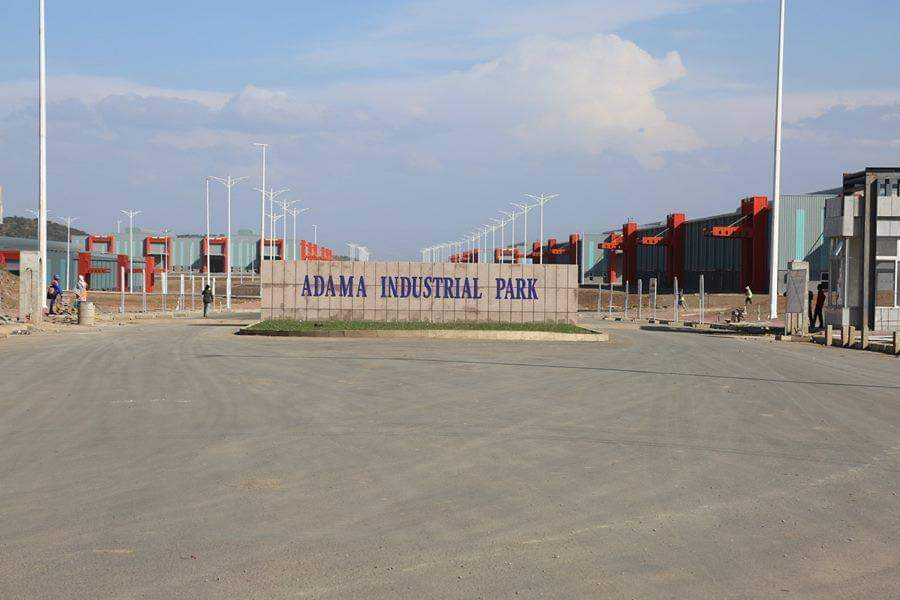
Fortune News | May 21,2022
On Ras Lulseged Street, one of the oldest streets in Addis Abeba, sits one of the oldest buildings in the country, most famously known as Tamama Fok, "the slanted building." The building, true to its name, does look like it is slanted to the side.
Built in 1972 and officially named Progress Building, it is slanting tall and strong to this day and is now housing the newest business venture in the city. A big new sign that reads "One Stop Beverage Shop" adorns the entryway to the first glass-panelled floor. The entire first floor, previously used as a showroom for cars, has given way to shelves displaying a multitude of beverage products.
Owned by Electrocommercial S.C., the shop that opened up two weeks ago was incepted nearly nine months back by Roberto Gabresi, an Ethiopian of Italian origin. This newly renovated store is bringing beverage brands of all kinds under one roof to the customer. It is not just that the store provides a variety of brands to its customers that makes it special, it is also the nature in which it has done so.
While walking through the doors, the ergonomic set-up of the venue guides the customer to make a trip throughout the store before reaching the cashier and paying their bills, walking through sections representing different brands, from Coca-Cola to recent additions to the market like Anbessa Beer.
The sections are divided by the brand they are assigned to with the aesthetic and products of each company beckoning customers over. Companies like Habesha Brewery, have decked out their corner with the traditional Ethiopian setup; wooden and leather-bound chairs, a traditional basket cover hangs on the wall and a mural painting of its most iconic representation - the Habesha face with the Afro.
It is not just Habesha Beer that has made its mark on the place. Brands like BGI, Diageo and Coca-Cola are already in the mix, while Awash Winery and Dashen Beer will shortly join the ranks.
"It all started with a few text messages that I sent to representatives of different brands, all of which had instant positive feedback," said Roberto, Electrocommercial's shareholder and managing director.
Some have finalised their display designs, while others, like Anbessa Beer, expect to complete their display in no more than two weeks. It is the first time that competing brands have come together to work under one roof without claims to exclusivity.
Roberto says that this new venture was a child of necessity.
Coca-Cola is one of the companies providing products to customers at the shop.
"With our former business of importing vehicles and electronic equipment becoming more and more difficult," he said, "we had to come up with a new business model to supplement the income of the business."
Electrocommercial was first established nearly six decades ago by Rizzo Sperandio, who first came to Ethiopia in the 1930s seeking business opportunities in the country.
Under Electrocommercial, Rizzo went on to open up Akaki Metalworks, Kaliti Metal Works, Ethioplastic and Ethiosidar and built the Progress and Finfine buildings. These were all later nationalised by the government in 1974, and the family found itself left with only Electrocommercial S.C. overnight. Despite their losses, the business continued and later started importing cars and electrical equipment.
Electrocommercial, which also owns Origin Water, has since then faced difficulties.
"It has become tough to get foreign exchange in the last three to four years, so we've had to be innovative in our approach," he said. "As an alternative, we now buy vehicles and equipment whenever there are auctions by the Customs Authority here and recently this new business venture."
The new business has also brought solutions to different partnering brands, because it fits with different goals they are working to achieve.
For companies like Anbessa Beer, which rolled out its products last May, it is a good business platform with low costs, according to Ameha Mesfin, the company's channel marketing manager.
"Most places have an exclusivity deal, so it's hard to penetrate places like that," said Ameha. "Additionally, we pay exorbitant prices for exhibition centres, and here it's a free opportunity to market our competitively priced products."
Even brands like Coca-Cola, which marked 60 years last January since it began operations in the country, have found it winning in terms of its ingenuity.
The sections are divided by the brand they are assigned to with the aesthetic and products of each company beckoning customers over.
"The idea was new - and we asked how we could tap into that," said Lewi Belay, the company's country sales and marketing manager.
For Coca-Cola, the gains lie in customer reach and affordability.
"We're working on providing the best service to customers," Lewi said. "They can come and get our products without waiting in lines, and it will be even more convenient once the delivery motorbikes are operational."
The shop, as direct retailer of the brands, also solves the issue of authenticity for many customers. The products come directly from the companies, and they are sealed and stamped straight from the producers, their contents unadulterated.
"This solves a lot of complaints that come from our users," said Wintana Shimelis-Poujade, spirits commercial director at Diageo, which spent 370,000 Br on the interior design at the location and has over 30 brands distributed in the country.
"This also helps us to fill the gap in the retail market," she said. "We Ethiopians have a culture of gathering at home for different occasions, and food and drinks are a big part of that. This falls in with our plans to reach these customers."
It is not just the companies, but employees alike, that seem excited by the prospect this new business has brought.
1all has 16 employees currently and has purchased 10 motorbikes for when they start delivery services door-to-door. The motorcycles, bought for 60,000 Br each, are in the process of being branded by respective companies for a fee. Their ownership belongs both to the company and the employees, who have invested half of the cost.
Saron Wole, who has been working there for more than a year in the sales and marketing department, is one of the employees that has invested 30,000 Br in the motorbikes.
"As employees of the company, we were approached first on whether or not we wanted to be a part of it. This is an extra way to earn money for me. I can do both this job and join the delivery team," said the 25-year-old, who is planning to get her motorbike license shortly.
The plan is to confer ownership entirely to employees once enough deliveries have been made, and the payment for the remaining half is finalised.
The beverage companies, occupying from 70Sqm to 140Sqm, do not pay rent. Instead, they provide their products to the shop at an agreed upon price, and the shop offers its sales representatives.
The prices are, in turn, lower than other supermarkets or liquor stores, and this is done to tap into the bigger community. The brands also use their platforms to drive transactions and bring in customers.
"Creating a workspace where competing brands are trusting and willing to work together is something to applaud," says Woretaw Bezabih (PhD), an expert on entrepreneurship. "It shows creativity as well as unity. At this time, entrepreneurs should look toward export substitution and focus on local manpower, resources and knowledge."
The store is now serving a diverse lot of clients - from individuals to liquor and meat shops to hotels. Africana Restaurant, located near Karl Square, is one of several restaurants receiving delivery service.
"We were informed of the store by the sales representatives of our suppliers," said Nebiya Berhane, owner of Africana. "We give the shop a call whenever we need to refill our stock once or twice a week, and they're here within the hour."
1all also has representatives from Zemen Bank and the Commercial Bank of Ethiopia at the location to further facilitate payments for customers.
"We want to provide a turnkey solution," said Roberto. "There is resistance to change and a lack of adaptability from different corners, but the nature of business in Ethiopia requires patience, and we have a lot of that."
PUBLISHED ON
May 23,2020 [ VOL
21 , NO
1047]

Fortune News | May 21,2022

Radar | Apr 17,2021

Radar | Nov 09,2024

Radar | May 15,2021

My Opinion | Jul 22,2023

Films Review | Sep 24,2018

My Opinion | Jul 13,2019

Radar | Jun 26,2021

Commentaries | Jan 29,2022

My Opinion | Dec 11,2020

Dec 22 , 2024 . By TIZITA SHEWAFERAW
Charged with transforming colossal state-owned enterprises into modern and competitiv...

Aug 18 , 2024 . By AKSAH ITALO
Although predictable Yonas Zerihun's job in the ride-hailing service is not immune to...

Jul 28 , 2024 . By TIZITA SHEWAFERAW
Unhabitual, perhaps too many, Samuel Gebreyohannes, 38, used to occasionally enjoy a couple of beers at breakfast. However, he recently swit...

Jul 13 , 2024 . By AKSAH ITALO
Investors who rely on tractors, trucks, and field vehicles for commuting, transporting commodities, and f...

Jul 5 , 2025
Six years ago, Ethiopia was the darling of international liberal commentators. A year...

Jun 28 , 2025
Meseret Damtie, the assertive auditor general, has never been shy about naming names...

Jun 21 , 2025
A well-worn adage says, “Budget is not destiny, but it is direction.” Examining t...

Jun 14 , 2025
Yet again, the Horn of Africa is bracing for trouble. A region already frayed by wars...